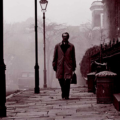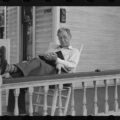Eucharist: Dimitris Lyacos’s “With the People from the Bridge”
 “A Couple and Two Children Sleeping on a London Bridge” by Gustave Dore
“A Couple and Two Children Sleeping on a London Bridge” by Gustave Dore
Dimitris Lyacos’s long, tripartite poem, Poena Damni, is one of the most important and challenging literary works to come from Greece in the past generation, and has achieved an international reputation: his poem has become one of the most widely reviewed works of contemporary Greek literature and has inspired a diverse range of sister projects—drama, contemporary dance, video and sculpture installations, photography, opera, and contemporary music. With the People from the Bridge, translated by Shorsha Sullivan and published by Shoestring Press, presents a thoroughly reworked version of the second section of Lyacos’s trilogy, originally published as Nyctivoe. There will perhaps not be a definitive version of the poem until its parts, published separately in English as well as in Greek, appear in a single volume. Thus, a consideration of it as a whole may be premature. The separate parts, however, stand as individual works, so the current installment can be properly considered on its own.
“Poem” is itself an approximate genre description of this complex and polyvalent text, which combines elements of staging, ritual, and passages whose indentation on the page seem to mark them as verse soliloquy, choral incantation, or simple description. There is a figure, the Narrator, who doesn’t narrate but seems to function as a kind of stage manager and director, assigning the other “players” their roles and action; tenses fade in and out of the first person, and, in the absence of named individuals, identities only slowly coalesce and are seldom stable for long.
He turns and signals the women to start. They start all together.
It’s a while since you’ve been out.
You sit inside and
wait. Sometimes as if heard
or so you think. It seemed this way,
when you went outside and came
to the door.
Nothing. You live with it though.
Same every dayThey stop, look at each other and round about
sometimes more so.
like voices somehow, more or less.
It is inside you.That. Afterwards, though, comes the day
they come outside
you wait for them in the house.
Same day every time.
Sometimes in the morning when
you wake up it is as if you are stuck
and you prise yourself off them.
You want to stay a little more
you don’t want to get up. You turn look
right left in case they came. No.
They haven’t come. But get up
it’s today.
Today. Get up.
Another year gone by and we willThey stop suddenly, for a few seconds, again, who is this?
be all together.
A few hours still. Then we will sleep,
wake up
will wait. Will sleep.
Wake up. Will wait.All together. Narrator wipes his hands on his pullover,
signals to them, they stop, they would have continued.
He reads.accounting that He
was able to raise them up
In these disparate materials, nothing seems wasted or arbitrary. The sense of atmosphere they build is cumulative and compelling—but you will look in vain for anything approaching a resolution.
The setting of the poem is likewise ambiguous. There is indeed a bridge, though it has no indication of traffic: perhaps it is a derelict structure, or perhaps the people who live by or under it, like any homeless population, are simply cut off from any economy beyond scavenging. On the other hand, these are not the people “under” or “of” the bridge; they’re people “from” it, implying that the bridge is a more than temporary abode. It might be better to suggest that their home is rather a situation, and that the bridge, which comes from nowhere and goes to nowhere (an indistinct past; an uncertain future), is an emblem of it.
The “people”—thirteen more or less identifiable characters, but also assorted voices and disembodied presences that appear among them as revenants—are, like any homeless population, living in difficult conditions. They burn fires for warmth. They use a cut-down oil drum as a table-cum-altar. But they also possess a working TV and the cast-off technology of a video cassette; books and newspapers are occasionally brought in from outside, primarily for fuel. All this suggests that some form of modern civilization persists elsewhere, but the past and present are equally inter-penetrable. It’s as if time had been beaten flat.
If there is any privileged moment, it is the biblical one, for biblical texts are quoted, paraphrased, or intimated throughout the text, and the Bible is the one book the people do not consider burning. This point d’appui creates the spatio-temporal grid on which the poem rests, enabling Lyacos to move from remote antiquity and folklore through visionary figures such as Dante to the stalled and crumbling enterprise of modernity. If we’re never entirely clear where (and when) we are, it’s because we’re everywhere at once, among the living and the dead, all of them copresent in the matrix of the text.
It stunk. Engine oil and rubber and smoke. Chorus. A cloth wrapped around a stick, they soak it, throw it too into the drum. They tore up two or three books too. Flames. All together, Chorus.
How long have you been in. When was the last
time you went out. What is left for you is here.
You don’t want to go out, you only remember
and wait, sit inside and listen to the rain.
You rake the ash.
A half-burned twig curling upwards a little.
You stay inside. Wait.
Hush. Listen now. Did you hear?
They have come. They will sit side by side.
You will bring them something to drink.
This year they have come from farther away.
Let’s sit all together.
Get up and come look through the window.
Look outside
They are coming, look at the street,
there are already enough of them
down there, look further back,
you see how many there are?
At the end of the street it is full. Wait a bit.
Do you see them there?
Like a wave that swells as it comes.
Full now. Here, look here.
A great flock splitting left and right.
Each one gets to his door
knows which one.
There is still something in their minds.
You wanted to go and find them.
But they come and find you before that.
Leave the door open for them to come in.
Listen. He is coming up the stairs.
Don’t stand up. He is coming.
He came up. He has come.
They have come together.
Lyacos offers, one might say, a displaced Christian vision—perhaps the only vision of wholeness available to our own chronological hour. At its most exalted, the Christian vision was one of a kingdom of souls, living, dead, and yet to come, all comprehended in the eternal gaze and embrace of God—but torn, too, by the competing empires of Heaven and Hell. The vision was at once unitary and fluid, and deeply penetrated, as historical Christianity was, by the darker visions of folkloric myth, of wandering spirits, of vampires, of unseen presences just beyond the campfire. Christianity sought to banish or at least domesticate these figures, but in its present techno-barbaric decay—the Narrator with nothing left to narrate; the communication devices with nothing to communicate—they unsettle us again. A quotation from Mark 5.9 early in the poem reminds us of the task of exorcism faced by early Christianity:
For he said unto him, come out thou
unclean spirit from the
man, and he asked him;
what is thy name? and he answered
saying; my name is legion
for we are many.
What Jesus expels is not a single spirit but a figurative host. Whether and to whom this is welcome remains unclear. The barking dogs invoked throughout the poem symbolize both the underworld (Cerberus) and the kind of sensory alertness that detects the uncanny; they are, too, emblematic of the feral creatures of social decay. This symbolic polyvalence takes the place of metaphor, and Lyacos is able, because of the temporal simultaneity he creates, to suggest a complex and reverberant matrix for which what seems the plainest of speech will serve. At the same time, however, broken utterance and fragmentary syntax undercuts this apparent simplicity, leaving the reader suspended over a void. It is also belied by the wealth of cultural reference embedded in it by silent quotation and allusion. This is no parade of learning for the critical cognoscenti, however. As in Beckett, the pressure of an entire civilizational epoch lies behind the most seemingly casual and transparent rhetorical gestures.

With the People from the Bridge
by Dimitris Lyacos
translated by Shorsha Sullivan
Shoestring Press, 2014
In what one might call the conventionally apocalyptic postmodern text, a vision of broken narrative, endless repetition, and meaning not signified but depleted by speech and gesture would appear to be the goal. There are moments that, taken in isolation, seem to suggest this in Lyacos as well. Speech and action are repeatedly broken off; circumstances seem, by sheer dint of repeated invocation, to grow, if not worse, then something worse than that: petrified. Fires will not stay lit; wounds will not heal. Seagulls that swoop to peck at exposed flesh seem to indicate a city under a particularly intimate and malefic kind of siege. But Lyacos’ aim is not to depict despair as such. It is rather, in the deeply Christian signification of the poem, to suggest the possibility of redemption.
His fundamental insight is that redemption is dialectically entwined with despair, and that one cannot be called forth without the other. This too is Christian—the dark night of the soul that in Christian eschatology precedes the moment of grace.
In Lyacos, this is experienced not simply on an individual level, as in case of the particular worshipper or mystic, but as a collective crisis in which personality and community are inextricably interwoven, and each person, even in solitude, experiences in and for the whole. Identity is fused and con-fused within the whole, so that personhood is experienced both as a primary datum in the most basic, carnal sense, and as a wider envelope within the greater whole whose coordinates shift direction and shape.
This kind of identity is not fixed in the stability of a self-validated consciousness, but drifts according to circumstance. It is anchored only in bodily suffering and pain. Love, in this context, becomes an uncertain fellow-feeling, in which attraction and aversion seem part of an unfocused search for some more transcendent connection, some tertium quid:
Hairs stuck on her skin.
She had sweated a lot.
That smell beside me, and
I couldn’t sleep.
Then I slept a little. When I woke up
I was holding her in my arms.
Later, again, I was searching for her in my sleep
the way I used to back then. A hand
that was drawing me in. Didn’t know how.
The speaker in this passage, identified as LG, lies down beside a woman he has known for some indeterminate time, whose odor, of some sickness or distress, is inescapable for him. He remains attentive (“I couldn’t sleep”), and when sleep does overtake him he finds himself searching for her within it, only to have cradled her even while doing so: a closeness inseparable from alienation, and vice versa. Is this love? Isn’t it? All that the speaker can testify to is the “hand” that draws him in to a situation he somehow consents to but is also powerless to avert.
This is something certainly closer to agape than to physicality, but it transpires as a series of physically-based gestures; nor is it clear, from the embrace LG finds himself in, that an act of love may not have been consummated, even without full consciousness (“A hand / that was drawing me in”). Some kind of consummation, of communion at least is implied, although of what sort cannot be stipulated. It is one, however, that appeals to an underlying chastity as well. The collective agape of community, and the ideal communion of salvation, is suggested in a later section of the poem:
They are coming, look at the street,
there are already enough of them
down there, look further back,
you see how many there are?
At the end of the street it is full. Wait a bit.
Do you see them there?
Like a wave that swells as it comes.
Full now. Here, look there.
A great flock splitting left and right.
Each one gets to his door
knows which one.
There is still something in their minds.
You wanted to go and find them.
But they come and find you before that.
Leave the door open for them to come in.
Listen. He is coming up the stairs.
Don’t stand up. He is coming.
He came up. He has come.
They have come together.
A “chorus” is speaking here, though the imperative voice appears to be addressing someone in the singular as well (“Here, look there”). The observer thus signifies the sight of a great crowd that seems to be forming in procession and then spilling over like a wave, a “flock” that divides at what seems the moment of an impact into single individuals for each of whom there is an appointed door he or she finds unerringly. This suggests an enactment of salvation in which the saved community—the “flock”—is disaggregated at the critical moment so that individual souls may find their destined way before the reunion of beatitude. At the same time, the journey is incomplete: there is “something in their minds” (singularly), ostensibly the signified observer, who for his part and in the same instant reaches to join them (“You wanted to go and find them”). In the divine instant in which act becomes coterminous with desire, the “observer” himself is discovered before he can even reach out.
In the last lines of the passage, the observer is again addressed imperatively (“Listen”), but what he is told to expect is not a throng but only a nameless singularity (“He”), who is indicated as simultaneously on his way and already present (“He is coming. / He came up. / He has come.”). The three tense instructions indicate the condition of time as overcome. Yet we are not to make the facile assumption that the “He” indicated here is the Christ. The community of the “flock,” though it has separated into individuals, each of whom has a separate portal, nonetheless immediately reconstitutes: “they” come and seek the observer; it is for “them” the door—his door—is to be left open; it is “they” who have, already, found him. The observer belongs to the flock, which is incomplete without him. There is no kingdom but that all must belong.
“With the People from the Bridge” is not the poem of a Christian apologist, but of an agnostic thoroughly penetrated by Christian tradition in its deepest sense, and to the folklore—pagan as well as Christian—that has formed around it as part of its historical substance. Whether or not we can or will be saved in any eschatological sense is left unresolved; what Lyacos wants to tell us is that we must all be saved—or save each other—together. Thus, the poem appears to end with its last remaining voice, that of its Narrator, offering the assurance of a resurrection in the flesh:
I will open your graves
and cause you to come up out of your graves
behold I will cause breath to enter into you
and I will lay sinews upon you
and will bring up flesh upon you
and will cover you with skin
and put breath in you
and ye shall live.
On the facing page, however, this final text: “The partially decomposed head of a / woman, stolen from a crypt at / Hollywood Memorial Park Cemetery / early Sunday, was found in the street / next up to a man who was subsequently / arrested, Los Angeles police said.”
The gruesome tabloid brings us back to earth, to the abiding reality of human depravity and the infinite distance that separates the world and salvation. But it is also the poet’s reminder that the heavenly company will always be incomplete as long as any member of the human community is left behind, and that someone is always being left behind.
About Robert Zaller
Robert Zaller is Distinguished Professor at Drexel University, as well as a playwright and poet, a critic whose contributions have appeared in The New York Times and The Nation and a leading scholar on Robinson Jeffers. He is the author of Robinson Jeffers and the American Sublime (Stanford 2012).





